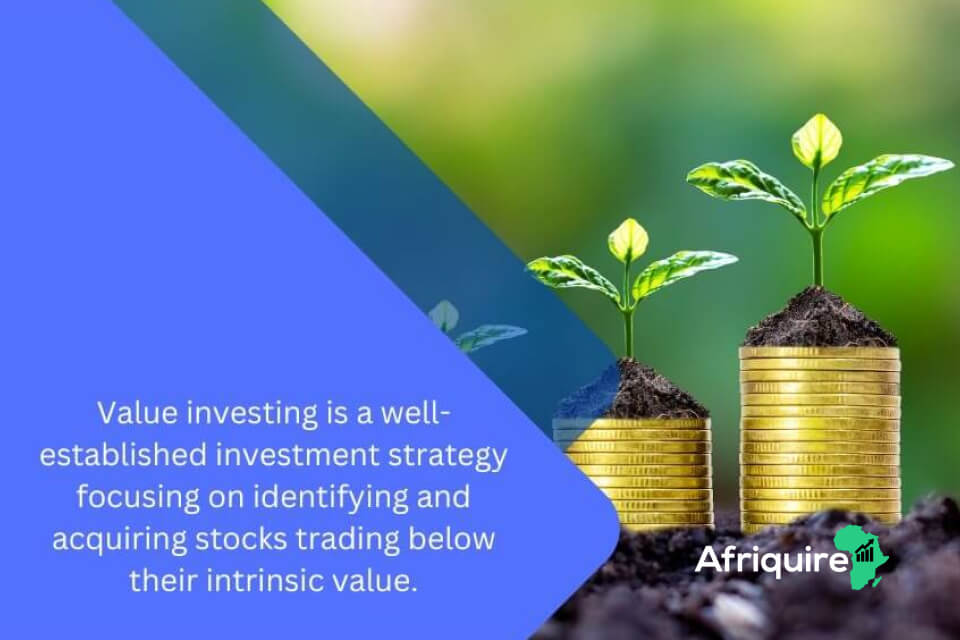Introduction
Investing in stocks can be exciting. It can also be rewarding. However, it often comes with challenges—especially for beginners. That’s why it’s important to understand the basics of value investing. With the right steps, you can make smart choices. Then, over time, you can see steady growth. Also, you can work toward long-term success.
This guide will walk you through the key ideas behind value investing. It will also help you understand fundamental analysis. And it will explain how to manage risk. Step by step, you’ll learn how to build your skills. You’ll also gain tools that help you invest wisely. In the end, you’ll feel more confident. Plus, you’ll have a solid foundation for the stock market.
Understanding Value Investing
Definition and Essence of Value Investing
Value investing is a time-tested strategy. It focuses on buying stocks for less than what they’re really worth. In other words, value investors look for companies with stock prices that seem low. Then, through research and analysis, they figure out the stock’s true value.
Because of this, the gap between the stock’s price and its actual worth creates what’s called a margin of safety. And with that margin, investors can buy at a discount. Also, they can wait for the market to catch up. Over time, as prices rise, the returns can be strong. Even better, the risk stays lower. So, value investing offers both safety and reward. Plus, it’s a smart way to grow wealth over the long run.
Historical Context and Notable Proponents
Value investing began with Benjamin Graham, often called the “father of value investing.” His classic book, The Intelligent Investor, laid the groundwork for this lasting strategy. In it, Graham stressed the importance of buying undervalued stocks. He also focused on long-term growth. And, just as importantly, he taught investors to manage risk through careful research.
Later, Warren Buffett—one of Graham’s most well-known students—took these ideas even further. Known as the “Oracle of Omaha,” Buffett added his own style. He stuck to the basics. He stayed disciplined. And through his company, Berkshire Hathaway, he showed how smart investing can build real wealth. Also, he proved that patience and sound judgment pay off over time.
Even now, investors around the world follow their lead. And every day, their lessons remind us that strong, thoughtful investing never goes out of style.
Link to Sustainable Growth and Long-Term Wealth Accumulation
Value investing isn’t about chasing quick wins. Instead, it’s about choosing steady growth. And it’s about building wealth that lasts. By buying undervalued stocks, you give yourself a chance to benefit as the market catches up over time.
This patient strategy reflects the old African saying, “Patience can cook a stone.” In other words, slow and steady often wins the race. Yes, markets may rise and fall. And yes, headlines may spark fear. But even so, staying calm and staying the course can lead to the strongest results. Again and again, discipline and focus prove to be the real keys to long-term success.

Fundamental Analysis in Value Investing
Explaining the Role of Fundamental Analysis
Fundamental analysis is crucial to value investing. It involves examining a company’s financial health, including its revenue, profits, debt, and overall operations. This process helps investors determine a company’s true worth, or intrinsic value.
With this information, you can assess whether a stock is priced fairly or available at a discount. To begin, explore company data on trusted platforms like Yahoo Finance or Google Finance to gather the necessary insights.
Key Components of Fundamental Analysis
Review Financial Statements
First, take a close look at the company’s key financial reports. These include the balance sheet, the income statement, and the cash flow statement. Each one tells a different part of the story. The balance sheet shows what the company owns and owes. The income statement highlights profit and loss. And the cash flow statement reveals how money moves in and out. Together, they show how well the company manages its money, controls costs, and grows over time.
Calculate Intrinsic Value
Next, figure out what the stock is really worth. This is called its intrinsic value. By comparing this value to the current stock price, you can see if it’s too high, too low, or just right. And by doing this, you can make better choices—ones based on facts, not hype.
Assess Competitive Advantage
Then, look at what sets the company apart. Does it have a strong brand? Does it own unique technology? Or maybe it controls a large share of its market? These strengths are often called “economic moats.” And just like a moat protects a castle, these features help protect profits. As a result, companies with lasting advantages are more likely to grow—and keep growing.
Case Study Illustrating Successful Fundamental Analysis
Apple Inc. and Microsoft Corporation are clear examples of how fundamental analysis can lead to strong investment results. Both companies showed steady revenue growth. Also, they had solid balance sheets. And just as important, they built loyal customer bases that kept coming back.
Because of this, investors who paid attention early saw the signs. They looked closely at the numbers. They studied the trends. And they spotted the long-term value. Over time, their patience paid off. Stock prices soared. And once again, this proved a simple truth: when you base decisions on real data, not guesses, the rewards often follow.
Long-Term Focus and Contrarian Thinking
Emphasizing the Importance of a Long-Term Perspective
In the fast-moving world of stock investing, it’s easy to get distracted by daily market ups and downs. Prices rise. Prices fall. And sometimes, the noise feels endless. But even so, value investing takes a different path. It’s all about thinking long-term.
By holding on to strong, reliable stocks, investors give their money time to grow. Also, this approach taps into the power of compounding. And at the same time, it helps smooth out the bumps caused by short-term market shifts.
In the end, patience makes a big difference. Over time, steady decisions often lead to more stable results. And more often than not, they lead to better rewards too.
Contrarian Thinking as a Cornerstone of Value Investing
Contrarian investing means going against the crowd. While most investors sell during times of fear, contrarian investors search for undervalued stocks to buy. This approach requires confidence and a strong belief in your own research.
In the fast-paced world of stock investing, it’s easy to get caught up in the daily noise. One day, prices surge. The next, they slide. And just like that, investors may feel tempted to react. But even so, value investing takes a slower, steadier route. It focuses on the long game.
By holding quality stocks over time, you give your money a real chance to grow. Also, you let compounding work its magic. And at the same time, you shield yourself from the stress of constant market swings.
In the end, patience pays off. Again and again, those who stay the course tend to see better results. Not right away—but over time, the rewards often speak for themselves.
Benefits of Patience and Disciplined Investing
Patience is one of the greatest strengths a value investor can have. Instead of chasing quick gains, you wait. You wait for the right price. You wait for true value. And by doing that, you avoid rushed choices and emotional mistakes.
At the same time, disciplined investing matters just as much. It means sticking to your plan. It means saying no to risky deals that look exciting but don’t fit your strategy. And yes, those moments will come. But staying focused helps you stay in control.
Over time, this mix of patience and discipline pays off. Again and again, it leads to more consistent growth. And more often than not, it leads to better results too.
Real-World Examples of Successful Long-Term and Contrarian Strategies
Let’s consider Investor Y. During a tough market downturn, many investors rushed to sell their stocks. But not Investor Y. They held on to a strong energy company, sticking to their strategy. When the market bounced back, that patience paid off with solid gains.
Now, take Investor Z. They took a steady approach, sticking to a long-term plan. By investing regularly in a well-diversified portfolio, they steadily built significant wealth over time.
Both of these examples show the power of patience and discipline. Time after time, these qualities lead to lasting success in the marketLet’s consider Investor Y. During a tough market downturn, many investors rushed to sell their stocks. But not Investor Y. They held on to a strong energy company, sticking to their strategy. When the market bounced back, that patience paid off with solid gains.
Now, take Investor Z. They took a steady approach, sticking to a long-term plan. By investing regularly in a well-diversified portfolio, they steadily built significant wealth over time.
Both of these examples show the power of patience and discipline. Time after time, these qualities lead to lasting success in the market

Emphasizing Quality and Fundamental Strengths
Quality Investing Defined
Quality investing means looking for companies with strong fundamentals and a proven track record. These are the companies that consistently show steady earnings, have low debt, and are led by strong, capable leaders.
Because of these strengths, they’re often better equipped to weather market downturns. They’re also more likely to support steady, long-term growth. By focusing on quality, investors can create a portfolio that’s more stable and reliable, one that can stand the test of time.
Identifying Quality Companies
1. Strong Financial Health
Start by looking for companies with steady revenue growth, healthy profit margins, and manageable debt. When a company shows these signs, it’s often a good indicator of financial stability. And stability, in turn, points to long-term potential for growth.
2. Skilled and Trustworthy Leadership
Next, pay attention to the leadership team. Companies with experienced and trustworthy managers are more likely to deliver consistent results. These leaders can also guide the company through tough market challenges, helping the business stay on track no matter what happens.
Linking Quality to Sustainable Growth and Reduced Risk
Quality companies can adapt to changing market conditions and manage challenges well. As a result, they often provide steady returns—even during difficult periods.
This reliability helps reduce overall risk in your portfolio and supports long-term success.
Case Studies Showcasing Quality-Driven Success Stories
Company A is a well-established manufacturer known for its innovative approach and strong leadership. Thanks to its focus on quality and careful long-term planning, it continues to grow—even when the market takes a hit.
As a result, businesses like this often deliver steady returns over time. More importantly, they help create a portfolio that can weather ups and downs. While some companies chase quick wins, firms like Company A build value year after year. Because of this, they offer a solid foundation for investors looking to grow their wealth with less stress.
In the end, investing in quality-driven companies isn’t just a smart move—it’s a strategy that supports long-term success.
Margin of Safety and Risk Management
Understanding the Concept of Margin of Safety
The margin of safety is a key concept in value investing. It’s the gap between a stock’s true value and its current market price.
This cushion helps protect investors from unexpected market swings and reduces the risk of losses. In short, the larger the margin, the more room you have for error.
Mitigating Risks through Margin of Safety
A margin of safety is one of the most effective tools for managing risk in value investing. It refers to the gap between a stock’s intrinsic value and its current market price. By buying well below the estimated value, investors create a buffer that protects their capital.
This buffer helps in several ways.
First, it allows for errors in valuation—if your estimate is slightly off, you’re still less likely to lose money.
Second, it shields your investment from sudden market shocks or bad news that might cause prices to drop.
Third, it encourages more disciplined buying, helping you avoid overpaying for overhyped stocks.
For example, if a stock’s true value is $100 but it’s selling for $70, the 30% margin gives you room to absorb potential downside.
In short, the margin of safety offers protection, encourages patience, and supports long-term success—especially in volatile markets.
Importance of Risk Management in Value Investing
Value investing isn’t about avoiding risk, but rather managing it wisely. Through thorough research and careful due diligence, investors can identify potential risks and make informed decisions to minimize them.
Real-Life Scenarios Demonstrating the Significance of Margin of Safety
Take Stock B, for instance. At first, it seemed like a smart buy. The fundamentals looked strong—steady revenue, manageable debt, and reliable earnings. So, not surprisingly, many investors jumped in. However, some took a more cautious path. They followed the margin of safety principle and, instead of buying right away, they waited for a better price.
As it turned out, that patience paid off. When the market turned volatile, Stock B dropped even more. Because of that, early buyers saw their gains vanish almost overnight. Meanwhile, those who waited and bought at a bigger discount held a stronger position. Their lower entry point acted as a cushion, softening the blow and helping them stay calm during the downturn.
So, what does this tell us? Quite simply, the margin of safety is more than just a smart investing rule. It adds a layer of protection. It allows room for error. And it helps manage risk when markets become unpredictable. In other words, while it may take discipline to wait, the long-term benefits often outweigh the short-term temptation.
In today’s uncertain climate, that kind of buffer isn’t just helpful—it’s essential.

Frequently Asked Questions
1. What is the role of sustainable growth in value investing?
Sustainable growth is key in value investing. It focuses on companies that can grow steadily over time while maintaining strong financial stability. This strategy aligns with the value investor’s goal of achieving long-term returns and minimizing risk.
2. How does contrarian thinking relate to value investing?
Contrarian thinking in value investing involves going against the crowd and seeking opportunities when market sentiment is negative. It’s about finding undervalued stocks when others are selling, allowing value investors to capitalize on market inefficiencies and potential future gains.
3. Can you explain the significance of a margin of safety in value investing?
The margin of safety is the difference between a stock’s intrinsic value and its market price. This gap acts as a buffer, protecting you from unexpected market fluctuations and uncertainties. By incorporating a margin of safety into your investment decisions, you can safeguard your capital and minimize the risk of losses..
4. How does fundamental analysis help in identifying quality companies?
Fundamental analysis evaluates a company’s financial health, management expertise, and competitive advantages. By scrutinizing financial statements and assessing intrinsic value, fundamental analysis helps value investors identify companies with solid foundations and the potential for sustainable growth.
5. How can African stock investors benefit from a long-term focus?
A long-term focus on value investing is especially advantageous for African stock investors. By holding quality stocks over time, investors can take advantage of compounding returns. This approach also helps them ride out short-term market fluctuations while staying aligned with the goal of sustainable wealth accumulation.
Conclusion
This guide has walked through the key principles of value investing—tools that every new investor in African markets should understand. By learning about fundamental analysis, long-term thinking, sustainable growth, quality companies, contrarian strategies, margin of safety, and risk control, you’ve built a solid starting point.
Of course, investing success doesn’t happen overnight. Instead, it grows with time. It comes from staying patient, remaining disciplined, and always being open to learning. And because markets can shift quickly, holding onto these core ideas will help you stay grounded—even when things get uncertain.
Moreover, by following these time-tested strategies, you’re not just investing—you’re building a future. And while others may chase quick wins, you’ll be focused on lasting results. That’s why value investing continues to stand the test of time.
So, take what you’ve learned. Then, apply it step by step. As you do, you’ll move closer to financial stability—and eventually, long-term growth.



